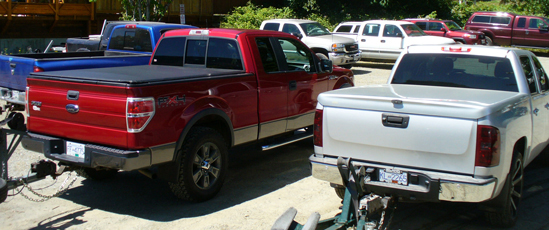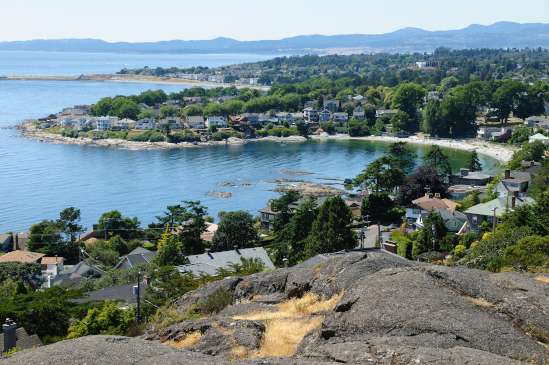
Reflections on Vancouver, British Columbia and other topics, related or not
How green
are their ridings?
A vehicle-deprived vagabond travels Canada’s
vehicle-dependent Green Party stronghold
Greg Klein | July 13, 2017
A Cowichan Valley boat ramp parking lot shows the region’s preferred
mode of transport. Those tow hitches aren’t for canoes or kayaks, either.
The traffic’s fast and furious. That’s alarmingly apparent as you risk crossing the road to any of the locally famous caffeineries after perusing the locally produced arts, crafts and food tempting visitors at Salt Spring Saturday Market. This is Ganges, a charming town in Saanich North and the Islands, one of three ridings that awarded the balance of power to the Greens in last May’s British Columbia election. But it’s unmistakeably car country.
Green MLAs will hold considerable influence in B.C.’s legislature as long as they can prop up the New Democratic Party minority government. Part of Canada’s Green power base, Saanich North and the Islands nearly coincides with the federal constituency of Green MP Elizabeth May and forms part of a trio of nearby provincial ridings that elected one incumbent and two new Green MLAs.
By comparison the rest of Canada has just two Green MLAs (one each in New Brunswick and Prince Edward Island) and zero MPs.
A nice spring afternoon in this Salt Spring Island town notwithstanding, Ganges hosts many more people behind the wheel than on foot. And they seem to be in one hell of a hurry. In their defence, some residents say Salt Spring has Canada’s highest proportion of EV ownership.
Speaking to CBC, one island dweller divulged unofficial data showing “111 electric cars [out of 10,640 people, over half of them old enough to drive], when statistically in Canada we should only have five.” Maybe, but the noise of this little town’s hustle and bustle suggests overwhelming loyalty to fossil fuels.
Like the other islands in Green MLA Adam Olsen’s constituency, Salt Spring’s linked to the outside world mostly by B.C. Ferries. To the frustration of foot passengers, the provincially owned company typically locates its terminals in out-of-the-way spots to provide plenty of parking space. One of the riding’s biggest employers, B.C. Ferries normally makes vehicle ownership a job requirement for employees at its terminals.
To the further frustration of the car-less, B.C. Ferries schedules sync poorly with those of B.C. Transit, the provincial purveyor of municipal and regional bus service. It offers very occasional service on Salt Spring and none on the riding’s other islands.
B.C. Green leader Andrew Weaver represents
a beautiful but largely car-dependent suburb.
Stroll along Oak Bay Avenue or any other Oak Bay-Gordon Head main drag and you’ll probably notice drivers exercising an un-Salt Spring km/h restraint. Nevertheless cars far outnumber pedestrians in this suburban Victoria riding bordering Saanich North. That’s despite this being a highly walkable neighbourhood with lots of convenient shops and services. There’s even, by Canadian standards, reasonably good bus service. This very affluent turf constitutes the domain of B.C. Green leader Andrew Weaver. Once again, vehicle-dependency seems to be taken for granted.
Like some of his party’s Salt Spring supporters, affluent climate scientist Weaver is said to tool around in an electric car. Maybe, like most politicians, he also takes token transit trips for political bragging rights. Of course the pyramid of CO2-reducing moral superiority builds from a car-dependent base to greater heights by ditching fossil-fuel engines for EVs, ditching EVs for transit, and ditching transit for walking or cycling. But the very apex of GHG-avoidance, according to one recent study, would be ditching parenthood. It turns out that babies—little scoundrels that they are—put other Big Oil lackeys to shame with their GHG profligacy.
That would seem to take the low-birthrate Western world off the hook, placing almost the entire climate-change blame on emerging societies. But the B.C. Greens’ push for free childcare and payments to stay-at-home parents seems irresponsibly averse to the big issue of our time.
Two bucks gets you a B.C. Transit ride all the way from the small Vancouver Island city of Duncan to Lake Cowichan. This weekend wayfarer took the trip on Canada Day, as one of only two passengers throughout the 29-kilometre, 45-minute trip traversing much of Green MLA Sonia Furstenau’s Cowichan Valley riding. The bus careens down Cowichan Lake Road, roughly parallel to much-busier Highway 18 and presumably the route that walkers and cyclists would take.
Would take. If there were any. There pretty much weren’t.
Big vehicles, mostly pickup trucks, dominate the town of Lake Cowichan. How can this Green valley reconcile this anti-Green lifestyle? Not easily. Still, even more than in Oak Bay, traffic moves slowly, at a relaxed rate that the average Salt Spring Green might achieve only with a heavy dose of environmentally correct Ativan. Downtown Lake Cow’s quite the experience actually, like witnessing a monster truck extravaganza in slow motion and with the volume turned way down.
Residential development sprawls about 15 klicks northwest to the former mill town of Youbou, now home to some fairly recently built large homes for fairly affluent people. Walking seems limited to very short distances to or from a vehicle. The one cyclist I saw looked as conspicuous as the magnificent elk ambling by.
Leave Furstenau’s constituency past Youbou and the road suddenly changes into a rough-hewn dust-cloud topsy-turvy gravel route with potholes big enough to swallow Elon Musk’s grandiosity. For those residents who might drive EVs, that pretty much limits their egress to the road back to Duncan.
So, if the typically Canadian vehicle-based lifestyle of B.C.’s Green ridings seems to contradict Green values, what drives—oops, shoulda said “inspires”—their ballot box choice? Did voters not consider their own reliance on vehicles and all the resources used to manufacture, maintain and fuel them? Or did voters just want to send a message to B.C.’s two cynicism-inducing establishment parties? That would be a reassuring thought, one that might restore a smidgeon of faith in our troubled species.
Nevertheless, these ridings make nice places to visit. Parts of them have bus service too, but you’ll have to check out the schedules for yourself. Not likely you’ll find many locals who use transit.

